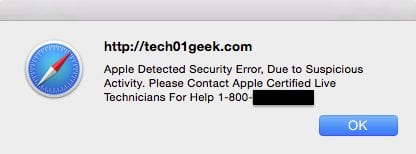Scams are nothing new on the Internet. But one that has become more prevalent recently is the “pop-up tech support” scam. For example, while browsing the Internet, a user sees a pop-up or a page that warns that their Mac might be infected or malware might be installed on it. The pop-up will include a toll-free number to call for immediate “Apple” support tech help or something similar.
I recently heard a father report a worst-case scenario. His daughter, who is away at college, had fallen for one of these scams, and she called the number for “support” and gave them her debit card to pay for the “fix”. She followed instructions to download and install a third party remote access utility to allow them to “fix” the problem on her Mac. (Hopefully she had a backup from before the support company’s “fix”, as an erase and reinstall of the OS should be done in cases like this. Yet another reason to have backups of your data.)

Of course users should never call any of these “support services”. If you see an instance of this, force quit the browser and if you’re using Safari, re-launch with the shift key held down and disable any extensions, remove website data/cookies and verify homepage settings. If you do fall victim to this, you should also change your passwords, notify your bank, cancel any used debit or credit card and monitor your accounts, etc.
And always avoid installing any software/add-ons from any where other than the developers’ website as sometimes general “software download” sites may include adware or – even worse – installer packages for other software.
For users of older OS X versions (10.6.x, for example), Safari hasn’t been updated, therefore other browsers like Firefox should be considered as they’re updated frequently. But regardless of browser, you still should avoid installing software/add-ons from untrusted sources. And be aware that even some “trusted” sources such as Java have been reported in the past to have included bundled browser add-ons/toolbars.
If you suspect you have adware/malware installed (search engine settings changed, pop-ups and redirects occurring, etc.), here are some resources to help you remove it. And it’s worth reading regardless of whether you have the suspicion.
- Apple’s article on removing adware that displays pop-up ads and graphics on your Mac including a list of some example Safari ad-injection extensions: support.apple.com/en-us/HT203987
- AdwareMedic removal utility for OS X 10.7 and later. (Note: some adware blocks access to AdwareMedic)
- TheSafeMac’s Adware Removal Guide
- Apple’s basic guide on protecting your Mac from malware: support.apple.com/kb/PH18656
Note: Both Apple’s removal guide and Adware Medic have been updated over time in an attempt to address new variants but might not cover all examples.
Another commonly reported concern for Apple customers is phishing emails that appear to come from Apple asking to verify account credentials (they often include a warning about your account being used for a recent purchase by a new device, etc.). Apple states they never ask you to provide personal information or sensitive account information (such as passwords or credit card numbers) via email. Here are some Apple support articles on the subject:
- Identifying fraudulent “phishing” email: support.apple.com/kb/HT4933
- Identifying legitimate emails from the iTunes Store: support.apple.com/kb/HT201679
- Safety tips for handling email attachments and content downloaded from the Internet: support.apple.com/kb/HT201675
Tech support scams are common via phone as well as online, and the FTC has sued several “phony tech support” companies over their practices. You can find more information here: consumer.ftc.gov/blog/ftc-cracks-down-tech-support-scams and get advice if you have been a victim of these scams.














Our team of AVG antivirus care service is available 24*7 to look after all the problem related to AVG antivirus. The team will provide you the best solution for your AVG related problem. As our team is well known from years and they know how to handle antivirus problems in the best way.
Beware of EasySoftTech in Ft. Worth, TX is a scam and they tell you they will pose as an Apple support to illuminate a very loud noise for fix your computer for almost $500.00!!! My incident happened at the end of July, 2016 and my friend caught my email and phoned me immediately to close down my computer. We made a phone call appointment with the Apple store and when we went they took care of everything for free. My friend found a picture of their ‘office’ in Ft. Worth, TX. in a ranch-style home. They probably put the virus in my computer themselves.
Nice information…you blog…
Beware pop up scam accompanied by very loud noise “Apple Alert” employed by Easy Soft Tech US,
Fort Worth Texas.
claiming they are Apple Support, which they are not Also falsifying their rating on BBB which has no record of their company in FT. Worth Texas!
EasySoftTech in Fort Worth TX is definitely a scam. It seems they have been flagged by credit card companies as they wanted a cheque from me. Fortunately I was able to put a stop on the cheque and Apple support helped me to check my iMac after that.
I was accessing my Medicare Account, when a pop -up warned me a connection was trying to access my info. It gave a Ph. # to call and a verification #.a guy with a thick Indian accent told me I would have to pay $100 for them to fix it i said no and hung up. Then a blue pop up claiming to be Micro soft tech. Help appeared with the very same # number to call. 855-846-5799.I did not call. I had to power off and reboot to get rid of the blue one. They’re preying on SR.Citizens!
Thanks for the info this happened to me and I didn’t know what to do. They didn’t mess up my apple like they would of windows
Pop ups may be responsible for online phishing scam or it may be annoying ads or misleading message.To stop these types of popups you can use popup blockers.Through internet searches you can easily found some best popup which are able to block such popups.Here i am suggesting you some popup you can try it i.e. popup blocker pro, ablockplus.org popup blocker, popup blocker etc.
The popup scam is alive and well. Last week I got a popup on my MacBook and ignored it. A couple days later I got the same message on my phone. It says something like – Malware has caused your system to crash. Call 877-246-2613. – These guys are amateurs, but I think that some people (especially the elderly) might fall for the scam. I played with them a while (I have an IT background) and them told them I knew this was a scam. I hung up. But the guy called me back! This time from his number 631-318-3183. Who/How/Where can these numbers be sent so they can be investigated by the authorities?
Is GLOBAL TECHNICAL SUPPORT FOR MACINTOSH (APPLE) A REAL COMPANY???
PLEASE ADVISE,,YOUR HELP WILL BE APPRECIATED.
If you need technical support from Apple, it is advised to only reach out to the company via its official support page.